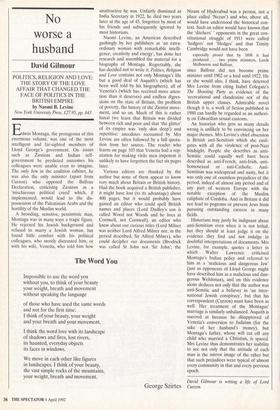No worse a husband
David Gilmour
POLITICS, RELIGION AND LOVE: THE STORY OF THE LOVE AFFAIR THAT CHANGED THE FACE OF POLITICS IN THE BRITISH EMPIRE by Naomi B. Levine New York University Press, £27.95, pp. 843 Edwin Montagu, the protagonist of this enormous volume, was one of the most intelligent and far-sighted members of Lloyd George's government. On issues such as Zionism and Indian self- government he predicted outcomes his colleagues were unable even to imagine. The only Jew in the coalition cabinet, he was also the only minister (apart from Curzon) who opposed the Balfour Declaration, criticising Zionism as a `mischievous political creed' which, if implemented, would lead to the dis- possession of the Palestinian Arabs and the hostility of the Muslim world.
A brooding, sensitive, pessimistic man, Montagu was in many ways a tragic figure. He rejected his Jewish background and refused to marry a Jewish woman, but found little comfort with his political colleagues, who mostly distrusted him, or with his wife, Venetia, who told him how unattractive he was. Unfairly dismissed as India Secretary in 1922, he died two years later at the age of 45, forgotten by most of his friends and subsequently ignored by most historians.
Naomi Levine, an American described gushingly by her publishers as `an extra- ordinary woman with remarkable intelli- gence, creativity and energy', has done her research and assembled the material for a biography of Montagu. Regrettably, she has decided not to write it. Politics, Religion and Love contains not only Montagu's life but a good deal of Asquith's (which has been well told by his biographers), all of Venetia's (which has received more atten- tion than it deserves) and endless digres- sions on the state of Britain, the problem of poverty, the history of the Zionist move- ment, and so on. Much of this is rather banal (we learn that Britain was divided between rich and poor and that `the glitter' of its empire was `only skin deep') and repetitive: anecdotes recounted by Mrs Levine are often followed by a full quota- tion from her source. The reader who learns on page 103 that Venetia had a rep- utation for making virile men impotent is unlikely to have forgotten the fact six pages later.
Various editors are thanked by the author but none of them appear to know very much about Britain or British history. Had the book acquired a British publisher, it might have lost (to its advantage) about 400 pages, but it would probably have gained an editor who could spell British names and places (Lord Dudley's son is called Wood not Woods and he lives at Cornwell, not Cornwall), an editor who knew about our curious titles (Lord Milner was neither Lord Alfred Milner nor, in the period described, Sir Alfred Milner), who could decipher our documents (Brodrick was called St John not `Sir John'; the Nizam of Hyderabad was a person, not a place called 'Nezan') and who, above all, would have understood the historical con- text. Such an editor would have known that the 'ditchers" opponents in the great con- stitutional struggle of 1911 were called `hedgers' not `Hedges' and that Trinity Cambridge would not have been
especially proud that by 1898 it had produced . . . two prime ministers, Lords Melbourne and Balfour,
since Balfour did not become prime minister until 1902 or a lord until 1922. He or she would also, I think, have deterred Mrs Levine from citing Isabel Colegate's The Shooting Party as evidence of the `recreational and clandestine sex' of the British upper classes. Admirable novel though it is, a work of fiction published in 1980 can hardly be regarded as an authori- ty on Edwardian sexual customs.
An historian who gets so many details wrong is unlikely to be convincing on her major themes. Mrs Levine's chief obsession is British anti-Semitism which she casti- gates with all the virulence of post-Nazi hindsight. People she describes as anti- Semitic could equally well have been described as anti-French, anti-Irish, anti- homosexual or anti-Catholic. Anti- Semitism was widespread and nasty, but it was only one of countless prejudices of the period, indeed of almost any period and of any part of western Europe with the notable exception of the Muslim caliphate of Cordoba. And in Britain it did not lead to pogroms or prevent Jews from pursuing outstanding careers in many fields.
Historians may justly be indignant about anti-Semitism even when it is not lethal, but they should at least judge it on the evidence they find and not indulge in doubtful interpretations of documents. Mrs Levine, for example, quotes a letter in which Walter Lawrence criticised Montagu's Indian policy and referred to him as a 'malicious and dangerous Jew' (just as opponents of Lloyd George might have described him as a malicious and dan- gerous Welshman), and on this evidence alone deduces not only that the author was anti-Semitic and a believer in 'an inter- national Jewish conspiracy', but that his correspondent (Curzon) must have been as well. Her treatment of the Montagus' marriage is similarly unbalanced. Asquith is sneered at because he disapproved of Venetia's conversion to Judaism (for the sake of her husband's money), but Montagu's father, whose will cut off any child who married a Christian, is spared.
Mrs Levine thus demonstrates her inability to see not only that the attitude of each man is the mirror image of the other but that such prejudices were typical of almost every community in that and every previous epoch.
David Gilmour is writing a life of Lord


























































 Previous page
Previous page